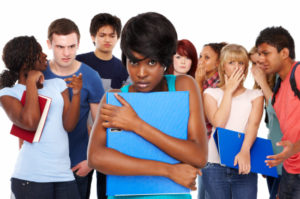How Can I Help When a Bully Strikes?

You may have come across social media videos of some people mistreating others either verbally or physically—or both. You may have even had to watch this happen in person, which can feel confusing and scary.
When a person uses their power and influence to hurt someone else or make them do things they do not want to do, it is called “bullying.” This can happen with words, such as saying hurtful things to make fun of someone, or with action, like punching and kicking. Watching someone else be bullied can be scary, overwhelming, and frustrating. Like many people, you may want to do something to stop the bullying but not know how or what to do.
If you are ever in a situation where you see bullying and want to make it stop, you can follow these steps to take action and do something about it. This is called “bystander intervention.”
- Safety first: Before stepping in to help another person, you must think about whether it is safe for you to do so. Ask yourself these questions to decide if it is safe:
- Does the bully have a gun or any other weapon(s) that could be used to harm you?
- Is the bully much bigger than you in size?
- Is the bully attacking the person?
If you answered “yes” to any of these questions, start by asking for help from a trusted adult or call the police at 911.
- Focus on the person being bullied: When you hear a bully using hurtful words, your first urge might be TRY to make them stop. A better idea is to ignore the bully and focus on the person being bullied. Here are some ways you can do this:
- Make direct eye contact with the person being bullied.
- Use other parts of your face to let the person being bullied know you are on their side. For example, smile.
- Start a random conversation with the person being bullied. You can talk about the weather, ask about their favorite movie, or tell them you like what they are wearing.
- Start the conversation with something like “hey, can I talk to you for a moment? I just wanted to tell you…”
- Remember to ignore the bully: The bully might try to get you to join the bullying or start saying hurtful things to you. Stay calm and focus on the person being bullied. If possible, move away from the bully. If you cannot move away, (for example if you are on public transportation), hold on to the conversation. Your goal is to create a safe space for the person being bullied. This can help the person gather their thoughts and the bully to gather their stuff and leave.
- Keep building a safe space: Focus on your conversation with the person being bullied until the bully stops and leaves. Many times bullies are looking for attention, so if you ignore them they will leave you alone. If possible, go to a different place with the person being bullied or stay with them until they let you know they are safe.
- One last step: Sometimes the person being bullied might want to stand up for themselves. It is important to respect that and follow their lead. So if they tell you that they do not want to have a casual conversation with you because they have to deal with the bully, you have done your part and can support them just by being there.
Bullying can happen any time and be overwhelming and scary. If you do not feel safe or comfortable to step in, it’s okay. You can still help by telling a nearby trusted adult and by taking a video or picture to explain what happened. If you feel safe, you can also approach the person being attacked once the bully leaves. You can tell them that you saw what happened to them and that you know it was wrong. Remember to always ask for permission from the person being bullied before sharing any videos or pictures of them.
Recently, you may have noticed more bullying towards people who identify as minorities. Minorities are people who belong to different racial, religious, or other identity groups, and bullies sometimes single out and attack these people based on their different identities. This type of bullying can be called a “hate crime.” Here is an example of a place to report hate crimes: https://www.splcenter.org/reporthate
Finally, if you or someone you know is being bullied, you should talk to a parent(s), teacher, school counselor, health care provider or another trusted adult. Here is a helpful link for more information:

